Abba Seraphim encourages support for E-petition on protection of religious minorities
Abba Seraphim has signed an E-petition recently placed on H.M. Goverment website, which is especially aimed at the Foreign & Commonwealth Office. The petition, which was drafted by Nicholas Crampton, founder of Eastern Christian Links, states:
“Noting with dismay the attacks on Coptic Churches in Egypt, and in Syria the kidnapping of the Syrian and Greek Orthodox Archbishops in Aleppo while working on humanitarian relief and of Father Paolo Dall’Oglio in Raqqa while working for Islamic/Christian dialogue and understanding,
We call on the UK Government
(i) To commit publicly to the promotion of toleration of and protection for religious minorities in the Middle East as an important part of UK foreign policy,
(ii) To demand of, and make a condition of diplomatic or any material assistance for, (a) the authorities in and any new Government of Egypt and (b) the members of the Syrian National Coalition, especially the Syrian National Council and the Free Syrian Army, that they publicly promise, enact and energetically enforce the protection of the practice of peaceful religious activities by all their citizens whether Muslim or non-Muslim.”
Abba Seraphim noted that H.H. Pope Tawadros II had recently called upon the Committee responsible for drafting the new Egyptian Constitution to extend its toleration to all non-Muslim religions and not merely to the “three heavenly religions” (Christianity, Islam & Judaism) and believed that religious toleration cannot be limited but should be open to all faiths. He commended the petition to all who respect freedom, justice and toleration: http://epetitions.direct.gov.uk/petitions/54532
Coptic New Year at Westminster
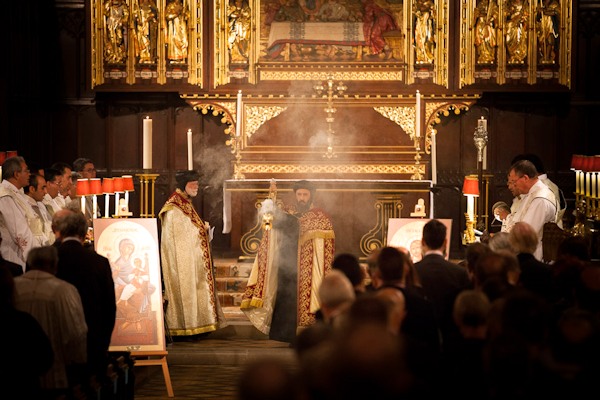
Abba Seraphim and Father Peter Farrington were among clergy assisting in the special Service commemorating the Coptic Feast of Nayrouz, hosted for the second year in succession at St. Margaret’s Church, Westminster. His Grace Bishop Angaelos presided and preached. Messages of welcome were made by the Rev’d Canon Andrew Tremlett, Rector of St. Margaret’s; The Archbishop of Canterbury (read in his absence by the Bishop of Gibraltar in Europe) and H.M. The Queen (read by the Countess of Verulam, Lord Lieutenant of Hertfordshire). At the conclusion, addresses were given by Baroness Cox of Queensbury; the Right Hon. Alistair Burt, MP, Parliamentary Under Secretary of State for the Foreign & Commonwealth Office and the Right Hon. John Bercow, MP, Speaker of the House of Commons. The Church was full and a large number of clergy from other churches joined the procession as ecumenical guests.
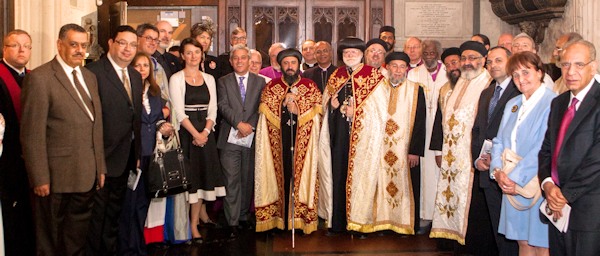
Historic visit of H.H. The Catholicos of the East
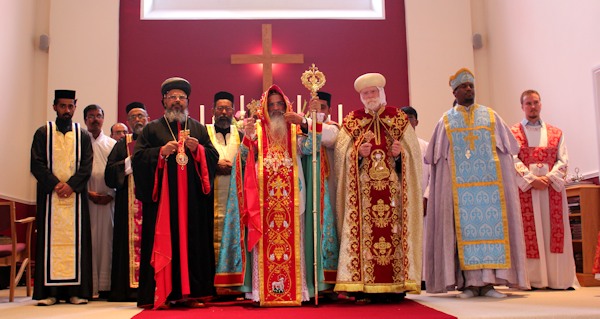
The recent visit of His Holiness Mar Basilius Mar Thoma Paulose II, Catholicos of the East, to England, was not only a great blessing for the Indian (Malankara) Orthodox Church in the United Kingdom but also a significant ecumenical event. His visit marked a number of historic anniversaries: 80 years since the first celebration of the Malankara Orthodox Syrian Qurbana in the Chapel of King’s College, London; 75 years since H.H.The Catholicos, Mar Baselios Geeverghese II visited the UK in 1937; 60 years since the Malayalee migration to the UK and 40 years since the formation of the St. Gregorios Congregation in London.
Abba Seraphim, accompanied by Subdeacon Daniel Malyon and Reader Trevor Maskery, attended the Divine Liturgy celebrated by the Catholicos at St. Gregorios Indian Orthodox Church in Brockley on Sunday, 8 September, and assisted in the liturgical celebration and the parochial speeches and festivities which followed.
On Monday, 9 September a Banquet of some 90 guests was held to honour the Catholicos at Lambeth Palace. In the absence of the Archbishop of Canterbury, the Bishops of Gibraltar in Europe (The Right Rev. Geoffrey Rowell) and Southwark (The Right Rev. Christopher Chessum) acted as hosts. Representatives of all the major churches were present as well as many leading members of the Malayalee community in the UK and friends of the Indian Orthodox Church. The British Orthodox Church was represented by Abba Seraphim, Father Peter Farrington and Father & Mrs. Simon Smyth.
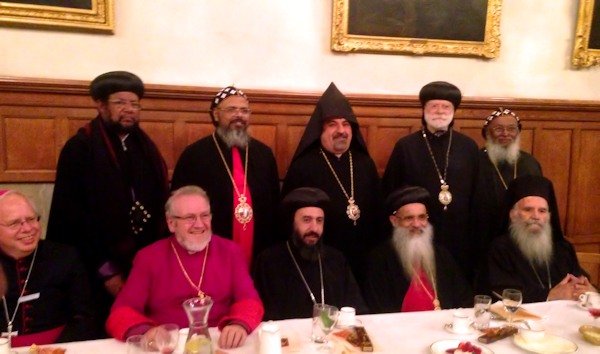
Indian Orthodox Church consecrated for Bristol
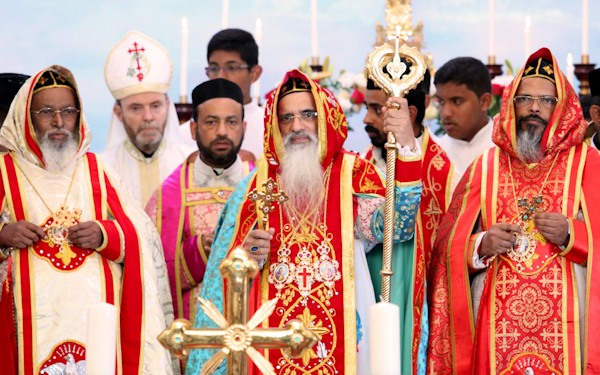
Accompanied by his wife Tasoni Sheila, Father Simon Smyth represented Abba Seraphim at the consecration of the new Indian Orthodox Church of Saint Mary in Pilning, Bristol, on Saturday 7 September. The building in Bank Road, Pilning, BS35 4JG was formerly St. Peter’s Primary School. The consecration and first liturgy was celebrated by His Holiness Baselius Mar Thoma Paulose II, Catholicos of the East, supported by the diocesan bishop, His Grace Metropolitan Doctor Mathew Mar Thimothius and His Grace Metropolitan Thomas Mar Athanasius, Bishop of Chengannur, together with seven Indian Orthodox priests and an enthusiastic congregation of several hundred. The whole day typified Oriental Orthodoxy at its best, filled with love, warmth and joy.
Although the Indian Orthodox Church in the United Kingdom & Ireland has twenty-three congregations, this is their third freehold church building. The Bristol parish was founded in October 2002 with only 25 families, but began growing rapidly, so that it was constituted a parish in August 2003 and now has 95 families. Plans to erect a traditional Malankara Church facade received support from the local council as likely to enhance the building’s appearance but is being opposed by the County Council as the building falls within the Green belt. Your prayers are invited for a successful outcome to the church’s appeal. Donations to the building fund can be made via the parish website: http://www.stmarysindianorthodoxchurchbristol.com/new-church-project/
British Orthodox submission to the Holy Synod on Catholic baptism
The Synod of the British Orthodox Church has submitted a recommendation to the Holy Synod of the Coptic Orthodox Patriarchate of Alexandria, that in the reception of those who have previously been members of churches accepting the Council of Chalcedon (including the Eastern Orthodox and Roman Catholic Churches) it should be by confession of faith and prayer, without any requirement for the reception of Baptism or Chrismation.
This recommendation is made on the basis that:
(1) The Coptic Orthodox Patriarchate has always received Chalcedonians by confession of faith and prayer on the clear and authoritative instruction of our holy Fathers including St Timothy, the 26th Pope of Alexandria, St Philoxenus of Mabbugh and St Severus. Even during periods of violent persecution our Orthodox Church has not deviated from this procedure.
(2) This has been consistently used as the only method of receiving Chalcedonians from the 5th century to the 19th century. Our own Coptic Orthodox Tradition shows that even Nestorians were received in such a manner.
(3) It is only in the most recent times that Catholics have been required to be baptised on their reception which is an innovation and contrary to the teaching of our holy Fathers.
(4) The development of various doctrines in the Catholic Church in later centuries is no justification for requiring the baptism of Catholics, since even Nestorians were not required to be baptised.
(5) His Holiness Pope Shenouda III of blessed memory signed an agreement with Pope Paul VI of Rome which spoke of the sacrament of baptism being present in both communities, and Bishop Gregorious, the Coptic president of the Theological Commission with the Catholics also insisted that there be mutual respect and regard for the baptism of Catholics.
(6) The Armenian, Syrian and Indian Orthodox all continue our ancient and authoritative Tradition of receiving Catholics without baptism.
